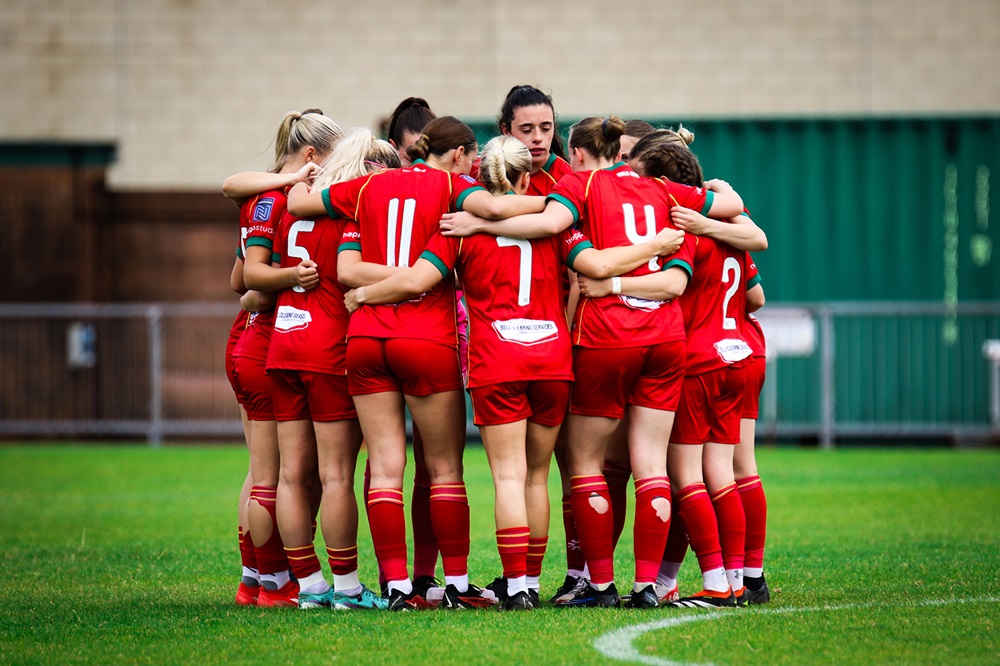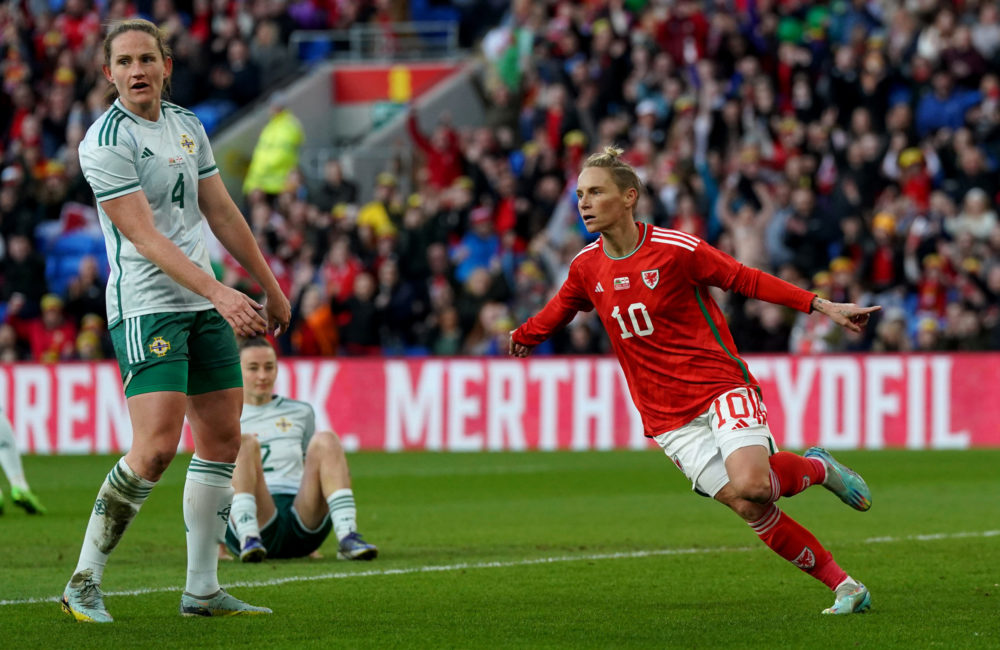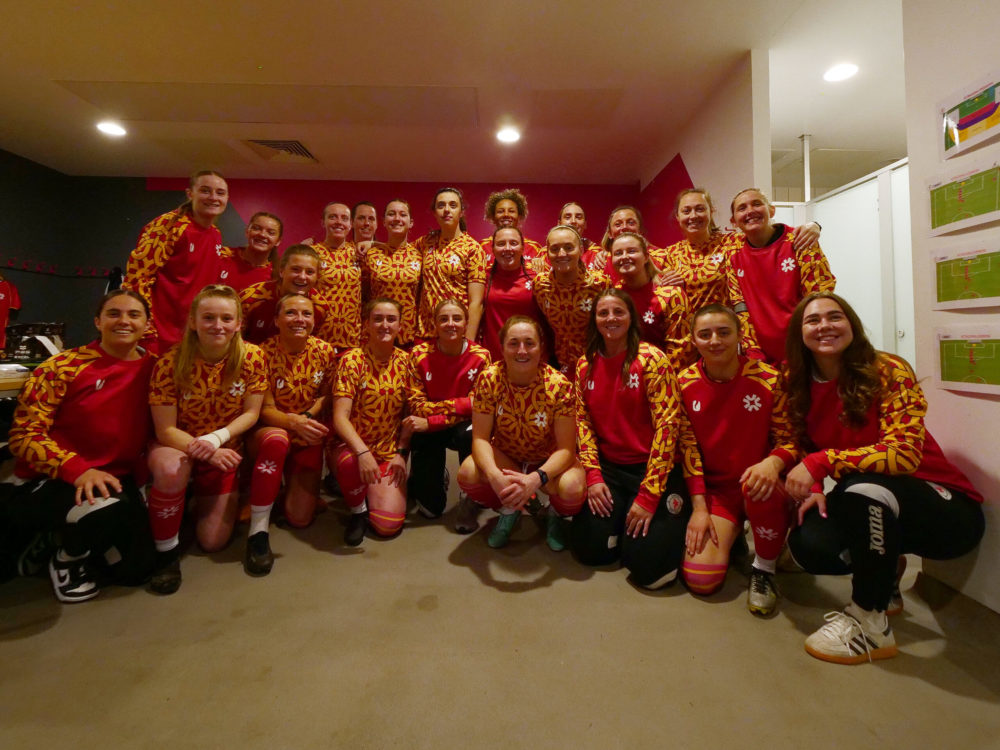‘We’re creating a future where women’s sport in Wales can thrive’, says co-owner of Wales’ top women’s football team

On St David’s Day this year, Julian Jenkins, the sports entrepreneur who co-purchased Cardiff City Ladies Football Team, confirmed the name of the club was being changed to Gwalia United.
Founded in 1975 as Llanedeyrn L.F.C. the club has targeted a place in the Women’s Super League, and alongside the name change announced a three-year sponsorship deal with the comparison site Go.Compare which will begin at the start of the 2024/2025 season.
In an in-depth Q&A with Nation.Cymru, Julian Jenkins explains why he bought the club and what ambitions he has for it.
Nation.Cymru: Why invest in a women’s football team in Cardiff?
Julian Jenkins: Investing in Cardiff City Ladies, now Gwalia United, was a decision that came from both passion and purpose. From the moment I became aware of the club’s rich history, I was intrigued. This is a team that has been at the forefront of women’s football in Wales, a team that helped launch the careers of some of the country’s most iconic players like Sophie Ingle and Jess Fishlock. But beyond that, I saw something that aligned with my own values – an opportunity to make a meaningful impact, not just in football but in society. Women’s football has always had to fight for recognition, especially in Wales.
There’s an untapped potential here, and when Damien [Singh, his business partner and co-owner] and I looked at the club, we saw an organisation with a strong foundation but one that needed direction and investment to realise its full potential. The history of Cardiff City Ladies spoke to me. I’ve been involved in various football projects in different parts of the world, but there’s something special about coming back to a place with deep roots in Welsh football and helping to build on that legacy.
One of the biggest motivators for me was the chance to contribute to the growth of women’s sport in Wales. I believe that football is a powerful tool for change, and investing in a club like this gave me the opportunity to help break down barriers for women in sport.
The chance to be part of that movement – at a time when women’s football is growing exponentially worldwide – felt like the right project at the right time.

Cardiff City Ladies, now Gwalia United, represents more than just a football club to me. It’s a platform to challenge outdated stereotypes, to push for equality, and to create real, tangible opportunities for women. The passion and drive I saw from the original founders, Karen Jones and Michelle Adams, was another key factor in my decision.
These are women who built this club from the ground up, often facing obstacles that would have discouraged others, and their dedication inspired me to get involved.
So, in many ways, my decision to invest in the club came from a combination of love for the game, respect for its history, and a desire to be part of something bigger than just football. It’s about creating a future where women’s sport in Wales can thrive, and Damien and I are proud to be part of that journey.
Nation.Cymru: What led to the rebranding of Cardiff City Ladies Football Team to Gwalia United, and how does this reflect the club’s ambitions for the future?
Julian Jenkins: Rebranding Cardiff City Ladies to Gwalia United was not a decision we took lightly. When Damien and I came on board, we saw the incredible history behind the team – our great club has brought through nearly 100 internationals at all levels. These players have shaped women’s football in Wales. But we also realised that to grow, we needed a fresh identity that not only honoured the club’s past but also symbolised where we want to take it in the future.
The name Gwalia is a traditional Welsh term [an old name for Wales], and choosing it was important to us because it represents our deep connection to Wales and our vision to create something that resonates with the local community while aiming for national and even international success.

This rebrand reflects our ambition to push forward in women’s football, to be more than just another club. We want to become a symbol of progress, inclusion, and excellence in Welsh sport and to drive the sense of pride through communities in Wales. The Women’s Super League (WSL) is a goal, but even beyond that, we want to contribute to the broader development of women’s football in Wales.
The rebrand also helps set a tone for the future – a future where we plan to professionalise the club further, strengthen our infrastructure, and provide the best possible opportunities for our players, both on and off the pitch. We’re determined to create a sustainable model, one that can support the club’s ambitions long-term. Gwalia United is not just about getting results today – it’s about building a foundation that will last for years, nurturing local talent and helping to push women’s sport to the forefront. In short, the rebrand is more than a name change; it’s a statement of intent about where we’re headed.
Nation.Cymru: How does Gwalia United balance honouring its past with ambitious plans for the future, and what role do the founders play in this transition?
Julian Jenkins: Balancing the past with our future ambitions is something we take very seriously at Gwalia United. This club has an incredibly rich history, thanks to the work of those who have gone before us. Their contributions to women’s football in Wales are immeasurable, and we’d never want to lose sight of that. Karen, Kerry and Michelle laid the foundation for everything we’re doing today, and they remain involved with the club, attending training sessions and sharing their wisdom and experience with the current players and coaching staff.
At the same time, we know that the world of football is evolving rapidly, and we have to move with it if we want to be competitive. Damien and I came in with a vision to modernise the club, but we’re always mindful of the legacy we’re building on. We’re incredibly fortunate to have so many of the key people involved and are still very much a part of what we’re doing, not just as symbolic figures but as active contributors to the club’s present and future.
Their presence keeps us grounded in the club’s origins while allowing us to push forward with new ideas. Looking forward, we’ve set our sights high. We want to compete at the highest level possible, and that means not just focussing on the immediate goal of promotion but also investing in long-term infrastructure. We’re bringing in new training techniques, fostering youth development, and seeking out partnerships that can support our growth. This balance between honouring our past and aiming for an ambitious future is key to everything we do.
Ultimately, our goal is to build something sustainable, where the values that are instilled in the club can thrive in the modern game. By staying true to our roots and pushing for excellence, I believe we can honour the legacy of this club while also charting an exciting course for the future.
Nation.Cymru: What are the major challenges Gwalia United faces in its quest to reach the Women’s Super League, and how do you plan to overcome them?
Julian Jenkins: There are definitely some significant challenges on our path to the Women’s Super League (WSL). First and foremost, the structure of women’s football in the UK is extremely competitive. With only 10 teams in the WSL and the Women’s Championship, the pathway to promotion is much narrower compared to the men’s leagues. There are only a limited number of spots, and we’re competing with clubs that have more established infrastructures and larger resources. It’s a tough climb.
Another challenge is that while we’re currently in the third tier, we’ve got around 25 teams above us that are also aiming for those coveted promotion spots. It’s a steep hill to climb, and it requires not just on-field performance but strategic thinking off the pitch as well.
But that’s where Damien and I really come into play. We’ve both been involved in ambitious projects before, both in business and football, and we know how to take on lofty challenges. For us, it’s about more than just winning games – it’s about building the infrastructure that will support long-term success. We’re investing in youth development, focussing on scouting, and bringing in expertise from different areas of the game to make sure we’re set up for sustainable growth.
We’re also working hard to raise the profile of the club and women’s football in Wales. Building a strong fan base, attracting commercial partners, and getting more media coverage are all essential if we want to be competitive at the highest levels. We’re under no illusions about the difficulty of the task ahead, but we’ve got the determination, the experience, and the strategy to get us there. Our journey to the WSL won’t happen overnight, but with the right approach and the Welsh nation behind it, I believe it’s entirely possible.
Nation.Cymru: What impact does Gwalia United hope to have on the growth of women’s sport in Wales beyond its on-field success?
Julian Jenkins: For us at Gwalia United, it’s not just about what happens on the pitch. Yes, we want to win games and achieve promotion, but there’s a much bigger picture here. One of our main goals is to be a driving force for the growth of women’s sport in Wales, particularly football. Historically, women’s football has been overlooked, and while we’ve seen great progress in recent years, there’s still a long way to go. Damien and I are both passionate about changing that.
We want to create a platform where young girls in Wales can see football as a viable path, whether they aspire to play at the elite level or get involved in other areas of the sport, like coaching, administration, or media. When I think back to the early days of the club, with people like Karen, Michelle, and Laura McAllister carrying their own goals out to the pitch and being laughed at for playing a “man’s game,” it really drives home how far we’ve come—and how far we still need to go.
Part of our mission is to change those outdated perceptions and to show that women’s football is not only here to stay, but it’s also growing stronger every year. We’re focussed on making sure that women’s sport in Wales is taken seriously, not just as a participation sport but as a thriving, elite product. This means building visibility, securing funding, and making sure our players are given the respect and support they deserve. Beyond that, we see Gwalia United as a beacon for equality and opportunity in sport. We
want to inspire the next generation, not just in Wales but across the UK. Our impact won’t just be measured by the trophies we win or the leagues we climb – it will be measured by how much we contribute to the growth and sustainability of women’s football in this country. That’s something I’m personally very passionate about, and it’s a core part of our vision for this club.
Nation.Cymru: What part do your experiences in top-level football at Cardiff City and [Swiss club] Servette FC serve in guiding your ownership of Gwalia United?
Julian Jenkins: My experiences at Cardiff City and Servette FC have been invaluable in shaping how I approach the ownership and development of Gwalia United. At Cardiff City, I had the opportunity to witness firsthand the complexity of running a club at a high level, from navigating the financial pressures to understanding how to build and maintain a competitive team. The Championship, in particular, is a very challenging league where resources are stretched, and the margins between success and failure are razor-thin. That environment taught me how important it is to balance ambition with sustainability, and that’s something I carry with me at Gwalia. We have big goals, but it’s crucial that we build on a solid foundation so the club can thrive in the long term.
Similarly, my time at Servette FC gave me a broader perspective on football’s global nature. Swiss football may not have the same profile as the English leagues, but the level of professionalism and organisation there is something I’ve brought with me. Servette went through its own transformation while I was there, and it reminded me how important it is to
have a clear vision for the future while staying adaptable to challenges that arise. The club’s recovery and progress gave me a deeper understanding of how to guide a team through periods of change and growth, something that’s especially relevant now at Gwalia United as we build for the future.
At both clubs, I learned the importance of community and connection to the fans. Football is nothing without its supporters, and that’s something I’ve always believed in. At Gwalia United, we’re trying to foster that same sense of belonging – where everyone feels invested in the journey, from the players to the fans to the volunteers. My experience at Cardiff and Servette reinforced the idea that success isn’t just measured by what happens on the pitch but also by the culture you build around the club.
That’s what we’re trying to achieve here at Gwalia – building something meaningful and lasting, both on and off the field. We know that the people of Wales feel their most patriotic when a referee blows a whistle and it is this sense of pride we want to inject into Gwalia United. This club can be the club side of a nation and that everyone can feel a part of, this is our club, our nation and our story and we can truly be together United.
Support our Nation today
For the price of a cup of coffee a month you can help us create an independent, not-for-profit, national news service for the people of Wales, by the people of Wales.





Interesting that Julian Jenkins use the term ‘patriotic’. Shame that patriotism doesn’t stretch to playing in Wales’s system
The same bloke who pushed the disastrous failed rebranding of Cardiff City to a different colour and badge now goes the whole hog to delete the Cardiff City name.